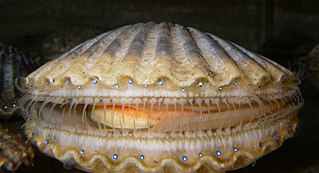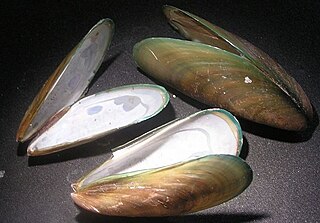| Esperiopsidae | |
|---|---|
| Scientific classification | |
| Kingdom: | Animalia |
| Phylum: | Porifera |
| Class: | Demospongiae |
| Order: | Poecilosclerida |
| Family: | Esperiopsidae Hentschel, 1923 [1] |
| Genera | |
Esperiopsidae is a family of marine demosponges.
| Esperiopsidae | |
|---|---|
| Scientific classification | |
| Kingdom: | Animalia |
| Phylum: | Porifera |
| Class: | Demospongiae |
| Order: | Poecilosclerida |
| Family: | Esperiopsidae Hentschel, 1923 [1] |
| Genera | |
Esperiopsidae is a family of marine demosponges.
The World Register of Marine Species includes four genera: [1]
Amphilectus is a genus of demosponges, comprising around 20 species found in oceans around the world.
Esperiopsis is a genus of demosponges, comprising around 30 species found in oceans around the world.

Murex is a genus of medium to large sized predatory tropical sea snails. These are carnivorous marine gastropod molluscs in the family Muricidae, commonly called "murexes" or "rock snails".

The Arcoida is an extant order of bivalve molluscs. This order dates back to the lower Ordovician period. They are distinguished from related groups, such as the mussels, by having a straight hinge to the shells, and the adductor muscles being of equal size. The duplivincular ligament, taxodont dentition, and a shell microstructure consisting of the outer crossed lamellar and inner complex crossed lamellar layers are defining characters of this order.

Turritella is a genus of medium-sized sea snails with an operculum, marine gastropod mollusks in the family Turritellidae.

The Pteriomorphia comprise a subclass of saltwater clams, marine bivalve mollusks. It contains several major orders, including the Arcoida, Ostreoida, Pectinoida, Limoida, Mytiloida, and Pterioida. It also contains some extinct and probably basal families, such as the Evyanidae, Colpomyidae, Bakevelliidae, Cassianellidae, and Lithiotidae.

Palaeoheterodonta is a subclass of bivalve molluscs. It contains the extant orders Unionoida and Trigonioida. They are distinguished by having the two halves of the shell be of equal size and shape, but by having the hinge teeth be in a single row, rather than separated into two groups, as they are in the clams and cockles.

Heterodonta is a taxonomic subclass of saltwater clams, marine bivalve molluscs. This subclass includes the edible clams, the cockles and the Venus clams.

AlgaeBase is a global species database of information on all groups of algae, as well as one group of flowering plants, the sea-grasses.

Mytiloida is an order of marine bivalve mollusks, commonly known as true mussels. There is one extant superfamily, the Mytiloidea, with a single family, the Mytilidae.
The World Register of Marine Species (WoRMS) is a taxonomic database that aims to provide an authoritative and comprehensive list of names of marine organisms.

Alvania is a genus of minute sea snails, marine gastropod mollusks or micromollusks in the family Rissoidae.

Poecilosclerida is an order of the demosponge class. It is the most speciose demosponge order with over 2200 species. It contains about 25 recognised families. They are characterised by having chelae microscleres, that is, the minute spicules scattered through the tissues, usually in the 10-60 µm range, have a shovel-like structure on the end.

Protobranchia is a subclass of bivalve molluscs. It contains the extant orders Nuculanida, Nuculida, and Solemyida.
Pectinoida is a taxonomic suborder of large and medium-sized saltwater clams, marine bivalve mollusks, commonly known as scallops and their allies. It is believed that they began evolutionarily in the late Middle Ordovician era; many species, of course, are still extant.
Aaptos is a genus of sea sponge. These species are marine sponges in the family Suberitidae.

Solanderia is the sole genus of hydrozoans in the monotypic family Solanderiidae. They are commonly known as tree hydroids or sea fan hydroids.

Carditoida is an order of marine bivalve clams.
Esperiopsis cimensis is a species of demosponges found in the Atlantic waters around Cape Verde, western Africa. The species name is named after the type locality, Ilhéu de Cima.
Amphilectus strepsichelifer is a species of demosponges found in the Atlantic waters around Cape Verde, western Africa. The species name is a combination of the Latin strepsis = twisted, and chelifer = bearing chelae, reflecting the twisted condition of the chelae.
Amphilectus utriculus is a species of demosponges found in the Atlantic waters west of Mauritania, western Africa. The species name utriculus is Latin for "small water bag", referring to the hollow, flattened shape.

Carditoidea is a superfamily of marine bivalve clams.
| This article about a demosponge is a stub. You can help Wikipedia by expanding it. |